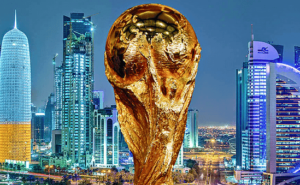A World Cup that has touched every aspect of Qatar’s development
 It is very common for countries hosting major events to proclaim that, hosting major sports events are tools for national development.
It is very common for countries hosting major events to proclaim that, hosting major sports events are tools for national development.
I have witnessed many major sports events and hardly find the linkage between sports and development, especially in Africa – as most of these events were business as usual -with infrastructure development tailored for the event with little or no connection to the general development of the country.
But the narratives from the 2022 FIFA World is unique and presents a practical case for sports and development, an industry which was hitherto was purely for entertainment.
Qatar, the tiny gulf country had given true and practical meaning to Sports and Development, linking every aspect of the world cup to its national development policy.
It is estimated that, Qatar spent over $22 billion on the organization of the competition with over $10 billion going to the construction of seven new stadiums, and the renovation of one, whilst the remaining $12 billion went into extensive road networks, metro system, new airport, security arrangements, telecommunications, with over 100 hotels and other accommodation options for the over 1.3 million visitors that visited the country.
For obvious reasons, this passed as the most expensive world cups in the history of the competition, but Mr. Nasser Al Khater Chief Executive Officer of the 2022 Qatar World Cup explained that the figure may be higher, but not directly into the competition, adding that some of the projects were already part of their national development agenda.
“We have plans of building a new airport, improving our road networks and embark on other development projects, the world cup was dovetailed into these plans. So, I don’t agree with people who say it’s an expensive world cup,” Mr. Khater noted
Qatar has indeed lived up to the name of the committee that organized the World Cup – Supreme Council for Delivery and Legacy.
A successful delivery of the World Cup is already a done deal and the legacies for the next generation of Qatar has indeed been achieved, as they have used sports to address their development objectives in a unique and profound way.
Among some of them are, Hamad International Airport, a light Railway, a bridge between Doha and Bahrain, new roads and the new Doha metro as well as the seven modern stadiums.
The Qatar authorities are predicting, a contribution to the national economy of around $20 billion (A$28.9 billion) with 1.5 million new jobs created in construction, real estate and hospitality.
Aside fulfilling their agenda of meeting national infrastructural development, Qatar has succeeded in embarking on extensive labour reforms that has projected the country as a labour friendly country, established a positive global image for themselves, despite the initial backlash from the western world after winning the world cup bid.
Being the first Arabic nation to host the global event, Qatar further projected the name and image of the Arab world, having attracted over 1.5 million visitors to the natural gas-rich country.
They have also succeeded in projecting Qatar as a tourism destination, with more than enough to explore, the Banana Island, the Desert beach, city skylines, beautiful beaches and many more.
The case of Qatar and the hosting of the 2022 FIFA World Cup is a real test case for study as they indeed gave a practical meaning to the theory of Sports and Development.
By William Dodzi Ezah, GNA Special Correspondent, Doha, Qatar)
Source: GNA
